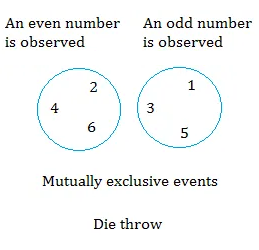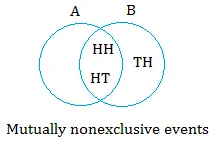Mutually exclusive events
Mutually exclusive events are events that cannot occur together. In other words these events do not have any common outcomes.
Consider the following 2 events when throwing a die once.
Let B = an even number is observed
Let A = an odd number is observed
B = { 2, 4, 6 } A = { 1, 3, 5 }
Do the events {1, 3, 5} and { 2, 4, 6 } have anything in common?
No they don't. Therefore, {2, 4, 6 } and {1, 3, 5 } are mutually exclusive events.

Suppose you flip a coin twice.
Let A = the first toss results in head
Let B = the tosses results at most 1 tail
A = { HH, HT }
B ={ HH, HT, TH }
Do the events { HH, HT } and { HH, HT, TH } have anything in common?
Yes, these events have HH and HT in common. Therefore, A and B are not mutually exclusive events.

A couple more example of events that are mutually exclusive and events that are mutually nonexclusive.
1)
A superintendent selects a student randomly from a school district to see if the student passed a state test.
Let A = the student passed the test
Let B = the student did not pass the test
Since a student cannot pass and fail the test at the same time, these two events are mutually exclusive events.
2)
A card is picked randomly from a deck of 52 cards.
Let A = the card is a 5
Let B = the card is a diamond.
Since 5 of diamonds will belong to both events, A and B mutually nonexclusive events.